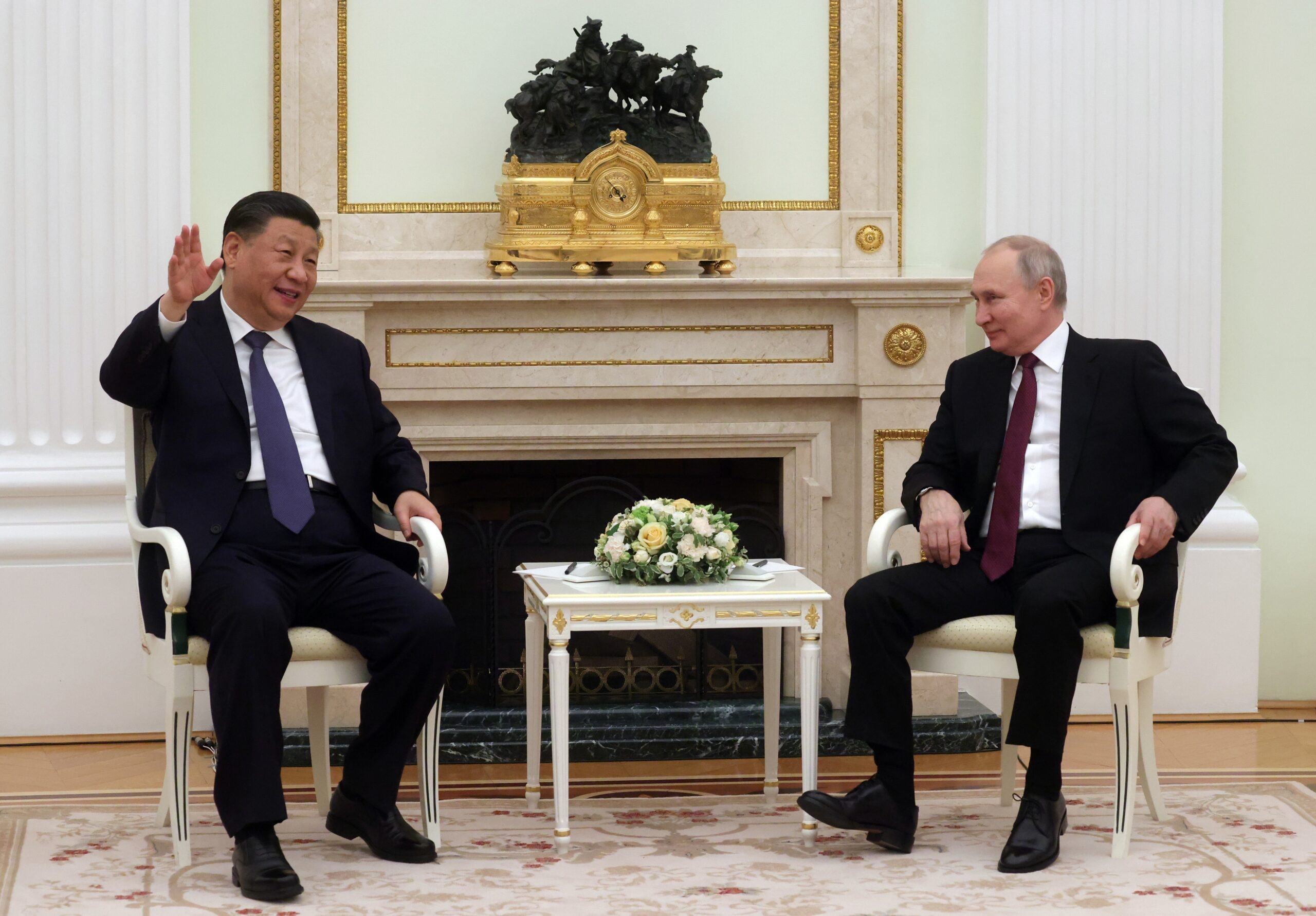For the average Chinese, the war between Russia and Ukraine is something rather obscure and distant. The Chinese political class’s discussion of a full-scale Russian invasion of Ukraine is hidden from outside observers and takes place behind the closed doors of Zhongnanhai, the seat of the Chinese government in central Beijing, west of the Forbidden City. One of the few resources for analyzing China’s strategy can be found in the public statements of the country’s leader. We looked at what Xi Jinping had to say about Ukraine in 2023, who he talked to about the issue, and what he wanted to convey to his interlocutors. Were his statements mere diplomatic clichés, or did Chinese ceremonies often mask China’s own problems and concerns?
What has Xi said about the «Ukrainian crisis» and to whom?
Let us turn to the database of Xi Jinping’s major speeches, which records everything the Chairman has said in recent years, with links to publications in the official press. Some of Xi’s speeches are duplicated because they were published on different dates in the Rénmín Rìbào (People’s Daily) newspaper and the Xinhua news agency. Throughout the 2023, Xi Jinping has used the phrase «Ukrainian crisis» /乌克兰危机about ten times. In most cases, the reference was no more than a formality of protocol, not followed by political decisions, administrative appointments or foreign policy agreements. The elegance of the Chinese language and of the diplomatic corps lingo is that you can replace the word «Ukrainian» with the name of any other state and nothing will change in the text. Every time Xi Jinping talks about the «Ukrainian crisis», he is actually talking about China and China’s future.
For much of 2023, Xi Jinping said nothing at all about the «Ukrainian crisis.» His speeches for January, February, May, July, September and October contain no mention of the «crisis.» The peak of references is, understandably, March 2023: on March 1−2, Xi Jinping held talks with Belarusian President Lukashenko, and on March 20−22, he made a state visit to Russia on 20−22 March.
In his talks with Lukashenka, Xi said that «(…) China’s position on the Ukrainian crisis is consistent and clear, China has issued a document with its own „Position on the Political Settlement of the Ukrainian Crisis.“ The essence of China’s position is to hold peaceful negotiations.»
On 20 March, the websites of Rossiyskaya Gazeta and RIA «Novosti» published an article by Xi Jinping entitled «Persevering towards new prospects for China-Russia friendship,» in which he stated that «China has always taken an objective and impartial position based on the nature of events, and has made active efforts to promote reconciliation and peace talks. […] This includes the need to uphold the purposes and principles of the UN Charter, respect the reasonable security concerns of all states, support all efforts to resolve the Ukrainian crisis peacefully, and ensure the stability of global production and supply chains. […] Complex problems do not have simple solutions. We believe that if all are guided by the concept of common, comprehensive, cooperative and sustainable security and continue dialogue and consultation in a balanced, prudent and pragmatic way, a reasonable way out of the Ukrainian crisis and a way to achieve lasting peace and universal security in the world will be found.» Later, Xi’s theses were incorporated, with minor adjustments, into the «Joint Statement of the Russian Federation and the People’s Republic of China on Deepening Comprehensive Partnership and Strategic Cooperation.»
All subsequent references to the «Ukrainian crisis» in Xi’s speeches remained virtually unchanged. The phrase «China’s position is consistent and clear» has become a stable phrase that can be found in almost every speech. The Chinese Foreign Ministry prepared a series of clichés that Xi Jinping repeated over and over to his high-level interlocutors.
· On 1 April, following a meeting with Spanish Prime Minister Pedro Sanchez, an article was published in which Xi Jinping «stressed that China’s position on this issue is consistent and clear and is to promote peace talks and a political solution.»
· On 6 April, after talks with French President Emmanuel Macron, Xi Jinping noted that «China’s position on the Ukrainian issue is consistent, clear and unambiguous. Its essence is to promote peace talks and a political solution. At the same time, there is no one-size-fits-all solution to the crisis. Each side must start with itself and, after building mutual trust, create conditions for a ceasefire and peace talks.» On 7 April, at an informal dinner with Macron in Guangzhou, Xi Jinping added: «The causes of the Ukrainian crisis are complex, its prolongation is detrimental to all parties, an early ceasefire is in the interests of all parties concerned and the whole world, a political solution is the only right way out.»
· On April 14, the Chinese leader held talks with the Brazilian president and stated the following: «The two sides agreed that dialogue and negotiations are the only feasible way to resolve the Ukrainian crisis.» On June 6, Xi Jinping also had a telephone conversation with South African president Cyril Ramaphosa on bilateral relations and the Ukrainian crisis.
· On August 23, at the XV BRICS Summit in Johannesburg, Xi Jinping mentioned that «the current crisis situation in Ukraine is the result of the most complex factors. Under the current circumstances, the primary task of resolving the situation is to defuse tensions, cease fire, start negotiations and reconciliation, and it is unacceptable to add fuel to the fire and escalate the situation.» This was followed by a joint statement issued on August 25, after the China-Africa leaders’ dialogue, in which China praised the constructive measures proposed by African leaders to resolve the Ukrainian crisis.
· On November 3, Xi Jinping had a video call with German Chancellor Olaf Scholz. Xi Jinping stressed that «in order to resolve […] the Ukrainian crisis, it is necessary to think more seriously about security issues, adhere to the concept of common, comprehensive, cooperative and sustainable security, and promote the building of a balanced, effective and sustainable security architecture.»
What are the main conclusions to be drawn from Xi’s speeches?
China is neither a party nor a cause of the conflict. China refrains from condemning Russia’s full-scale military invasion of Ukraine, but at the same time it provides humanitarian aid to Ukraine. Any new identity for China — ally of Russia, ally of Ukraine — would mean accepting a new set of commitments, joining economic and political instruments of pressure on Russia, or guaranteeing military-technical and financial assistance to Ukraine. Neither side of the conflict has managed to change China’s position throughout 2023.
China thinks about the economy
China rejects sanctions and economic pressure. As Xi Jinping has argued more than once, «individual states should stop politicizing the global economy and trying to turn it into a tool.» Once again, China is talking less about Russia and more about itself. The U.S. government has imposed and continues to impose sanctions on institutions and members of the Chinese government and Communist Party of China, affiliates of the People’s Liberation Army, companies and individuals, and Chinese nationals that the U.S. government deems complicit in human rights abuses in the Xinjiang Uygur Autonomous Region, Hong Kong, and Tibet. According to the US Department of Commerce, 721 Chinese companies, organizations and individuals in China are currently on the «Entity List», which restricts their ability to purchase goods from the US. Recent sanctions decisions include controls on advanced computing and semiconductor manufacturing in China, as well as sanctions on precursor chemical producers and sanctions for supplying fentanyl production equipment to drug cartels in Mexico.
China’s logic is to separate the political from the economic. First, if existing trade rules allow China to buy semiconductors and compete fairly with other global buyers, what reason is there to deny China the right to sell these semiconductors? China has not violated trade rules, there is no question of price for China, so are we suggesting that such transaction can be interrupted by a political decision of the US government because it does not please the US and does not meet its political objectives?
Second, sanctions are not effective. As practice shows, sanctions did yield immediate results: external economic pressure did not change Russia’s domestic and foreign policy course. The same applies to China. The political should be solved by political means, the economic – by economic means.
China thinks about diplomacy
If the «Ukrainian crisis» does not end in a nuclear explosion, its final stage is bound to be peace talks. The parties will reach certain agreements, third countries and organizations will act as guarantors of the implementation of these agreements, and China will remind the world that on February 24, 2022 it presented a 12-point plan to resolve the conflict and called on the parties to cease hostilities. It was at that moment that the Chinese authorities stressed that they were ready to «play a constructive role» in the peace talks, which should be resumed as the «only viable» way to resolve the Ukrainian crisis.
In the best-case scenario, China could become a venue for peace talks and take an active part in the post-war reconstruction of Ukraine’s infrastructure. But even if a peaceful settlement is reached without China, its diplomatic position won’t suffer in the slightest: Xi Jinping told everyone a long time ago that the matter would end in peace, but the world didn’t listen. China has not interfered in interstate relations between two sovereign states. China has not supplied arms to either side of the conflict. China has provided humanitarian aid to Ukraine. China has traded and maintained political dialogue with both Russia and Ukraine. China has complied with economic sanctions against Russia. China has participated in an international meeting in Jeddah at the suggestion of Ukrainian President Volodymyr Zelensky on the peaceful end of the Russian-Ukrainian war.
What more do you want from China? China has been telling you all to come to the negotiating table from the beginning, and war has never been a tool that China has supported.
China thinks about the methods of warfare
As Xi Jinping noted, «China is willing to join France in calling on the international community […] to properly implement the pledge not to use nuclear weapons or start a nuclear war, to oppose the use of biological weapons under any circumstances, and to oppose armed attacks on nuclear power plants or other civilian nuclear facilities.»
Nuclear weapons are one of the most important guarantees against external invasion of the territory of a state that possesses them. It is not nuclear weapons per se that protect, but the threat of their use. It should be noted that after Xi Jinping’s public statements on the inadmissibility of the use of nuclear weapons, even the deputy chairman of the Russian Security Council, Dmitry Medvedev, a rather acrimonious figure, to say the least, has became much more cautious about the ideas of a preventive nuclear strike in whatever he posts on his Telegram channel.
China is thinking about its future security
China has been exposed the crisis of the international security system and its institutions. The need to respect the goals and principles of the UN Charter is routinely emphasised, but after two years of the full-fledged war it is clear that the UN has failed to prevent the crisis, failed to stop it and failed to become a platform for peace talks. As, indeed, has any other international organisation.
At the same time, China does not call for reform of existing global institutions. China is «willing to join France in calling on the international community […] to build a balanced, effective and sustainable security architecture in Europe». But making a call is one thing, participating in shaping the security architecture in Europe is quite another. The current system of international security was built by Western countries, the guarantors of the system were Western countries, the conflict is taking place in the centre of Europe, European countries are involved, etc. Between the lines one can read China’s big rhetorical question: «And what do you want?» Another way of paraphrasing the response of Chinese diplomacy even more siccintly refers us back to the classic line of Russian bureaucracy from the early 2000s: «Address your concern to whichever agency that has issued the paperwork in question.»
What should the security system look like in the future? The People’s Republic of China believes that it is possible not to dismantle whatever is functioning now, but that the issue of security should be discussed by a wider range of states. In Xi’s conversation with Scholz, we see an insistent call for dialogue, because «a situation in which the security space of other countries is squeezed by supporting one side while ignoring the legitimate demands of the other side will lead to regional imbalance, the growth and escalation of conflicts.» This is not so much true of Russia or Palestine today, but of China in the future. China has far more potential conflicts in the future than any European country.
Xi Jinping is surely not altogether honest when he calls on Spanish Prime Minister Pedro Sanchez to «abandon the Cold War mentality and resist bloc confrontation.» The call to move away from bloc confrontation can be read as follows: it is much easier for China to negotiate with each state separately because of its own economic power, demographics, extensive network of political institutions and Chinese diaspora. A multipolar world is one in which China has no rivals. «Do not unite» could be the motto of Chinese diplomacy. China is undoubtedly unnerved by the creation of AUKUS, a trilateral security alliance between Australia, the UK and the US, or QUAD, a quadrilateral security dialogue between Australia, India, the US and Japan. China has been relatively successful in confronting each member of these alliances individually, but when a group of states manages to establish effective channels of interaction and their political, ideological and economic models largely coincide, China has an adversary of equal stature. Due to the peculiarities of its political regime and economic model, as well as a rather specific ideology, China is unable to create an effective international institution. BRICS, SCO, Forum on China-Africa Cooperation (FOCAC), China’s «Belt and Road» initiative (known inside China as «One Belt, One Road») — these projects cannot become an alternative to the institutions of the world order. The reasons for this are simple: the lack of rules and institutions to enforce the implementation of certain agreements (what does an organisation offer other than a platform for dialogue?), unstable political regimes (a country’s membership depends on the momentary will of the current leader) and the incomparable size of the participants. Any organisation in which China participates is essentially «China and other countries.»
Conclusions
Throughout 2023, China has managed to maintain an amazing balance between all the states involved in the «Ukrainian crisis» in one way or another.
China continued to trade with both Russia and Ukraine. Trade turnover between Russia and China reached $ 196.5 billion in the first ten months of 2023, approaching the target of $ 200 billion a year, Russian Ambassador to China Igor Morgulov said. Thus, the volume of trade has already exceeded the record figures of 2022.
In 2019−2021, China was Ukraine’s largest trading partner. According to the State Customs Service of Ukraine, in the first seven months of 2023, Ukraine’s trade turnover totalled $ 57.5 billion. The countries that exported the most goods to Ukraine were China ($ 5.6 billion) and Poland ($ 3.8 billion). The countries to which Ukraine exported most of its goods were Poland ($ 3 billion), Romania ($ 2.2 billion) and China ($ 1.7 billion).
China’s relations with the EU and the US are developing on a separate track, in which the issue of the «Ukrainian crisis» is largely ignored. The main result of 2023 is that no one could make China an offer it could not refuse. Ukraine is an important player in China’s food security policy, but Ukraine does not have the means to turn China away from Russia. Russia is an important supplier of minerals, oil, gas and timber, a large and attractive market for producers of Chinese goods, and the Russian leadership would have loved to start building another Power of Siberia 2 gas pipeline. But China can also buy resources outside Russia. There are enough sanctioned states with oil and gas resources in the world to get a price that China finds advantageous.
Europe and the US suggest that China should be a responsible participant in international relations and take an active part in resolving the crisis, primarily by exerting economic and political pressure on the Russian leadership. China’s fair question, «What are you willing to give in return?» remains unanswered as of 2023.
At a press conference following her visit to Beijing in April 2023, European Commission President Ursula von der Leyen announced the basic principle of relations with China: not radical decoupling, but derisking. The meeting between Joe Biden and Xi Jinping in Woodside on November 15, 2023 yielded agreements to combat drug trafficking, the resumption of high-level contacts between the two countries’ militaries and the promise of consultations on the use and improvement of AI (artificial intelligence).
The US-China trade war continues unabated, the European market is less willing to cooperate with China, and US and EU leaders have criticised China on a number of fronts. In 2023, Russia and Ukraine, the US and the EU have failed to make an offer that could fundamentally change China’s preferences. China’s position on the Russia-Ukraine war remains neutral, with an emphasis on economic and diplomatic solutions, calling for peace and criticising the politicisation of the economy and sanctions.










